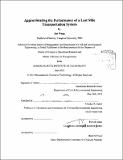Approximating the performance of a last mile transportation system
Author(s)
Wang, Hai, Ph. D. Massachusetts Institute of Technology
DownloadFull printable version (5.191Mb)
Other Contributors
Massachusetts Institute of Technology. Operations Research Center.
Advisor
Amedeo R. Odoni.
Terms of use
Metadata
Show full item recordAbstract
The Last Mile Problem (LMP) refers to the provision of travel service from the nearest public transportation node to a home or office. We study the supply side of this problem in a stochastic setting, with batch demands resulting from the arrival of groups of passengers at rail stations or bus stops who request last-mile service. Closed-form bounds and approximations are derived for the performance of Last Mile Transportations Systems as a function of the fundamental design parameters of such systems. An initial set of results is obtained for the case in which a fleet of vehicles of unit-capacity provides the Last Mile service and each delivery route consists of a simple round-trip between the rail station and bus stop and the single passenger's destination. These results are then extended to the general case in which the capacity of a vehicle is an arbitrary, but typically small (under 10) number. It is shown through comparisons with simulation results, that a particular strict upper bound and an approximate upper bound, both derived under similar assumptions, perform consistently and remarkably well for the entire spectrum of input values and conditions simulated. These expressions can therefore be used for the preliminary planning and design of Last Mile Transportation Systems, especially for determining approximately resource requirements, such as the number of vehicles/servers needed to achieve some pre-specified level of service.
Description
Thesis (S.M. in Transportation)--Massachusetts Institute of Technology, Dept. of Civil and Environmental Engineering; and, (S.M.)--Massachusetts Institute of Technology, Sloan School of Management, Operations Research Center, 2012. Cataloged from PDF version of thesis. Includes bibliographical references (p. 113).
Date issued
2012Department
Massachusetts Institute of Technology. Department of Civil and Environmental Engineering; Massachusetts Institute of Technology. Operations Research Center; Sloan School of ManagementPublisher
Massachusetts Institute of Technology
Keywords
Civil and Environmental Engineering., Operations Research Center.